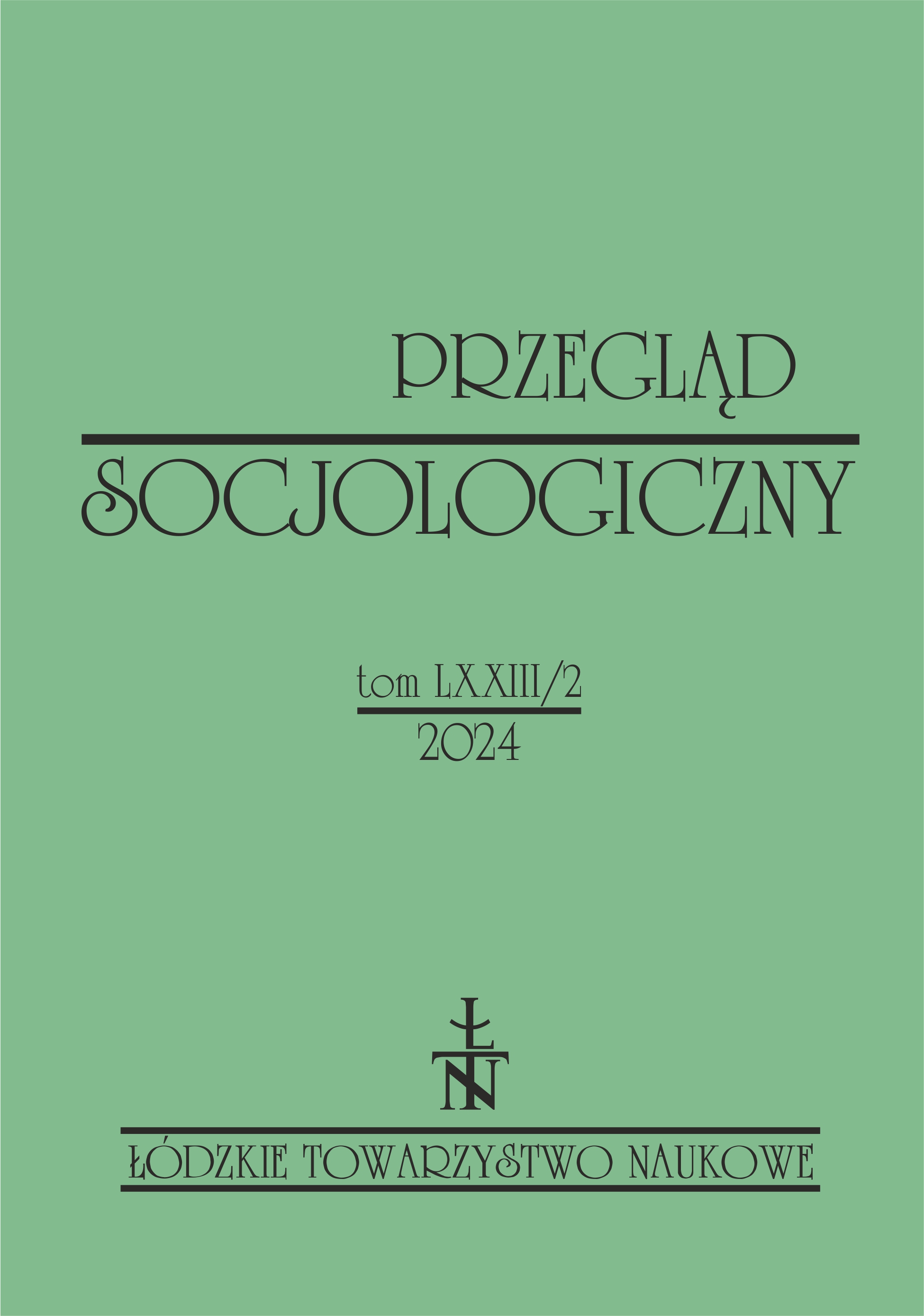„I came out of the House of Slavery…” About the path to spiritual nomadism using the example of a man searching for “his place” in the world
DOI:
https://doi.org/10.26485/PS/2024/73.2/4Keywords:
new spirituality, postmodern nomadism, spiritual nomadismAbstract
The focus of this article is the path to spiritual nomadism, considered using the example of a man who since childhood has been driven by the desire to “place himself”, i.e. to find his place in the world. The deliberations begin with terminological issues, where the author defines the spirituality characteristic of such nomads and postmodern nomadism in general, and methodological issues, where the context of the study and the method of analysing the research material are described. Then, the path leading to nomadism is reconstructed: from early experiences of the “emptiness” of the surrounding world, through attempts to find one’s own place (ending up stuck in a biographical trap), to stepping out of existing social structures and making a “subjective turn.” In conclusion, attention was drawn to the psychosocial nature of the phenomenon under study, which is probably a reaction to the postmodern disintegration of the architectures of meaning.
References
Barker Eileen. 2012. Nowe ruchy religijne. Kraków: Zakład Wydawniczy „Nomos”.
Bauman Zygmunt. 1994. Dwa szkice o moralności ponowoczesnej. Warszawa: Instytut Kultury.
Borowik Irena. 2016. Przemiany religijne w Polsce na tle transformacji w Europie Środkowo-Wschodniej i globalizacji. W: Globalny i lokalny wymiar religii. Polska w kontekście europejskim. I. Borowik, A. Górny, W. Świątkiewicz (red.), 7–16. Kraków: Zakład Wydawniczy „Nomos”.
Braidotti Rosi. 2009. Podmioty nomadyczne. Ucieleśnienie i różnica seksualna w feminizmie współczesnym. Warszawa: Wydawnictwo Akademickie i Profesjonalne.
Burszta Wojciech J. 2015. „Poszukiwanie sensu w globalnej logorei”. Roczniki Kulturoznawcze 6(1): 5–32. https://doi.org/10.18290/rkult.2015.6.1-1.
Charmaz Kathy. 2017. “The power of constructivist grounded theory for critical inquiry”. Qualitative Inquiry 23(1): 34–45.
Collins Pat. 1998. “New Age spirituality”. The Furrow 49(2): 91–97.
Cunningham Malcom. 2009. Wedanta i psychoanaliza. W: Psychoanaliza i religia w XXI wieku. D.M. Black (red.), 336–359. Kraków: Wydawnictwo WAM.
Czyżewski Marek. 2023. Single case as an object of analysis. In defense of a species threatened with extinction. In: Analysing Discourse, Analysing Poland. The case of political interview. Ł. Kumięga, M. Nowicka-Franczak (red.), 25–55. Göttingen: V&R/Brill.
Czyżewski Marek, Alicja Rokuszewska-Pawełek. 2016. Analiza autobiografii Rudolfa Hössa. W: Biografia i wojna. Metoda biograficzna w badaniu procesów społecznych. Wybór tekstów. R. Dopierała, K.Waniek (red.), 373–445. Łódź: Wydawnictwo Uniwersytetu Łódzkiego.
Deleuze Gilles, Félix Guattari. 2023. Traktat o nomadologii: Maszyna wojenna. W: Tysiąc Plateau. G. Deleuze, F. Guattari, 431–522. Warszawa: Fundacja Nowej Kultury „Bęc Zmiana”.
Delsol Chantal. 2020. Czas wyrzeczenia. Warszawa: Państwowy Instytut Wydawniczy.
Drury Nevill. 2011. Stealing fire from heaven: The rise of modern Western magic. Oxford: Oxford University Press.
Evola Julius. 2003. Ride the tiger. A survival manual for the aristocrats of the soul. Rochester: Inner Traditions.
Foucault Michel. 2020. Nadzorować i karać: Narodziny więzienia. Warszawa: Wydawnictwo Alatheia.
Frankl Viktor E. 2018. Wola sensu. Założenia i zastosowanie logoterapii. Warszawa: Wydawnictwo „Czarna owca”.
Frediani Marcelo. 2017. “On the road: New Travellers and their radical need for space”. Espaces et sociétés 171(4): 73–89. https://doi.org/10.3917/esp.171.0073.
Freud Zygmunt. 2013. Kultura jako źródło cierpień. Warszawa: Wydawnictwo „Alatheia”.
Fromm Erich. 2021. Mieć czy być?. Poznań: Dom Wydawniczy „Rebis”.
Han Byung-Chul. 2022. Społeczeństwo zmęczenia i inne eseje. Warszawa: Wydawnictwo Krytyki Politycznej.
Hanegraaff Wouter J. 1999. “New Age spiritualities as secular religion: A historian’s perspective”. Social Compass 46(2): 145–160.
Heelas Paul. 1996. The New Age movement: The celebration of the self and the sacralization of modernity. Oxford: Blackwell Publishing.
Heelas Paul, Linda Woodhead, Benjamin Seel, Bronislaw Szerszynski, Karin Tustingustin. 2005. The spiritual revolution: Why religion is giving way to spirituality?. Oxford: Blackwell Publishing.
Kohl Ines. 2010. “Modern nomads, vagabonds, or cosmopolitans? Reflections on contemporary Tuareg society”. Journal of Anthropological Research 66(4): 449–462.
Kuhling Carmen. 2007. “Mobility, marginality and modernity in New Age Traveller imaginary”. The Irish Review (Cork) 36/37: 78–94.
Luckmann Thomas. 1990. “Shrinking transcendence, expanding religion”. Sociological Analysis 2(51): 127–138.
Lundvall Maria, Ulrica Hörberg, Lina Palmér, Gunilla Carlson, Elisabeth Lindberg. 2020. “Young men’s experiences of living with existential concerns: «living close to a bottomless darkness»”. International Journal of Qualitative Studies on Health and Well-Being (15): 1–10. https://doi.org/10.1080/17482631.2020.1810947.
Mariański Janusz. 2019. Nowa religijność i duchowość – mit czy rzeczywistość? Studium socjologiczne. Warszawa: Warszawskie Wydawnictwo Socjologiczne.
Mariański Janusz. 2021. „O nowej duchowości – próba opisu zjawiska”. Nauki o wychowaniu. Studia Interdyscyplinarne 1(12): 40–68. https://doi.org/10.18778/2450-4491.12.04.
Pasek Zbigniew. 2008. Od religijności ku duchowości. Przyczynek do przemian kultury współczesnej. W: Idee i myśliciele. Filozoficzne i kulturoznawcze rozważania o duchowości i komunikowaniu. I.S. Fiut (red.), 13–26. Kraków: Wydawnictwo AGH.
Plant Sadie. 1993. “Nomads and revolutionaries”. Journal of the British Society for Phenomenology 24(1): 88–101.
Ra Uru Hu. 2011. The human design system. CreateSpace Independent Publishing Platform.
Riemann Gerhard, Fritz Schütze. 2012. „Trajektoria” jako podstawowa koncepcja teoretyczna w analizach cierpienia i bezładnych procesów społecznych. W: Metoda biograficzna w socjologii. Antologia tekstów. K. Kaźmierska (red.), 389–414. Kraków: Zakład Wydawniczy „Nomos”.
Schütze Fritz. 1997. „Trajektorie cierpienia jako przedmiot badań socjologii interpretatywnej”. Studia Socjologiczne 144(1): 11–56.
Socha Paweł M. 2014. „Przemiana duchowa jako kluczowe pojęcie psychologii rozwoju człowieka”. Psychologia Rozwojowa 19(3): 9–22.
Śpiewak Paweł. 2004. Midrasze. Księga nad księgami. Kraków: Wydawnictwo „Znak”.
Taylor Charles. 2001. Źródła podmiotowości. Narodziny tożsamości nowoczesnej. Warszawa: Wydawnictwo Naukowe PWN.
Voas David, Steve Bruce. 2007. The spiritual revolution: Another false down for the sacred. In: A sociology of spirituality. K. Flanagan, P.C. Jupp (eds.), 43–61. Farnham: Ashgate Publishing Ltd.
Wons Krzysztof SDS . 2020. Koczownik Boga. Abraham. Kraków: Wydawnictwo Salwator.
Woodhead Linda. 2007. Why so many women in holistic spirituality? A puzzle revisited. In: A sociology of spirituality. K. Flanagan, P.C. Jupp (eds.), 43–61. Farnham: Ashgate Publishing Ltd.
Woroniecka Grażyna. 2021. Buddyzm a cierpienie. Ogólne przesłanie a lokalne uwarunkowania. W: Cierpienie w perspektywie socjologicznej. P. Możdżyński (red.), 173–196. Kraków: Zakład Wydawniczy „Nomos”.
Downloads
Published
How to Cite
Issue
Section
License
Copyright (c) 2024 Łódzkie Towarzystwo Naukowe

This work is licensed under a Creative Commons Attribution 4.0 International License.



